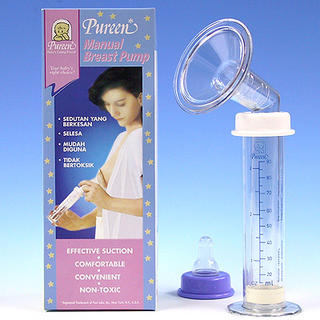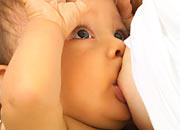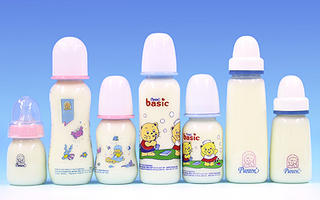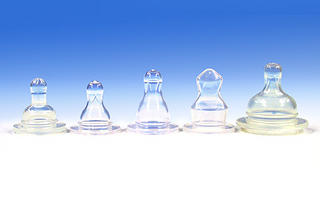
Breastfeeding?? Some people might think I'm being too open to discuss this matter here publicly.. however, I think it is good for everyone to know.. coz one day.. everyone will be parents...Insya Allah :)
Alhamdulillah, I am still breastfeeding Indah.. dah masuk 4 bulan dah.. and still susu masih banyak for her.. mak long.. the confinement lady told me that it is "rezeki anak" if the mother ada banyak susu to give to the child.. I'm happy to be one of the lucky ones :).. a midwife (bidan) once told me.. masa ngandung tu niat lam hati.. "nanti nak susukan anak ku ngan susu badan, insya allah susu nanti banyak".. kata mak bidan tu.. I took a step further by praying ,"nanti nak susukan Indah kalau diizinkan sampai Indah at least 2 years old.. amin.." :) skarang dah 4 bulan alhamdulillah Indah still wants to breastfeed eventhough dah start minum susu tong (formula) and makan biskut farley's.. ehehhehe
I bought the breast pump a few days before delivery.. reason buying it lambat lambat was.. my mom kata.. insya allah nanti susu kuar.. pump masa nak keje je.. maka lambat la belinya pastu beli yg simple je.. tak advice beli electric pump coz nanti susu cepat abis.. wallahualam.. tapi ikut je.. so I bought pureen breast pump just like the one in the pic :)
Pureen Manual Breast Pump - High quality, comfortable, convenient and effective in suction.non-toxic comfortable convenient effective in suction
Let me share with you the benefits of breastfeeding :)

Alhamdulillah, I am still breastfeeding Indah.. dah masuk 4 bulan dah.. and still susu masih banyak for her.. mak long.. the confinement lady told me that it is "rezeki anak" if the mother ada banyak susu to give to the child.. I'm happy to be one of the lucky ones :).. a midwife (bidan) once told me.. masa ngandung tu niat lam hati.. "nanti nak susukan anak ku ngan susu badan, insya allah susu nanti banyak".. kata mak bidan tu.. I took a step further by praying ,"nanti nak susukan Indah kalau diizinkan sampai Indah at least 2 years old.. amin.." :) skarang dah 4 bulan alhamdulillah Indah still wants to breastfeed eventhough dah start minum susu tong (formula) and makan biskut farley's.. ehehhehe
I bought the breast pump a few days before delivery.. reason buying it lambat lambat was.. my mom kata.. insya allah nanti susu kuar.. pump masa nak keje je.. maka lambat la belinya pastu beli yg simple je.. tak advice beli electric pump coz nanti susu cepat abis.. wallahualam.. tapi ikut je.. so I bought pureen breast pump just like the one in the pic :)
Pureen Manual Breast Pump - High quality, comfortable, convenient and effective in suction.
Description:
Pureen Manual Breast Pump is:
Let me share with you the benefits of breastfeeding :)

Breastfeeding protects your baby from gastrointestinal trouble, respiratory problems, and ear infections
Numerous studies from around the world have shown that diarrhea, lower respiratory illnesses, and ear infections happen less often in breastfed babies, and are less severe when they do occur. Exclusive breastfeeding (meaning no solid food) for at least six months seems to offer the most protection.
Researchers have found that immune factors that are present in colostrum (the first milk your body produces) guard against invading germs by forming a protective layer on your baby's mucous membranes in his intestines, nose, and throat. The main immune factor at work here is secretory IgA (immunoglobulin A). It's present in large amounts in colostrum — which is why it's important to start nursing your baby right after birth — but is also found in lower concentrations in mature milk.
Breastfeeding may also protect your baby from developing inflammatory bowel disease later in life. Several studies have documented a link between a lack of breastfeeding in infancy and later development of Crohn's disease and ulcerative colitis.
Breastfeeding can protect your baby from developing allergies.
Several studies have found that breastfeeding for six months or more makes it less likely that your baby will go on to develop food or respiratory allergies. At least one study has found that this protection appears to last well into adolescence. Another study found that preterm infants from families with a history of allergies had a lower risk of developing eczema than their formula-fed peers. A third study found that exclusive breastfeeding for at least the first four months after birth reduced a child's risk of developing asthma by age 6.
Scientists think that the fatty acids and immune factors such as IgA in breast milk prevent allergic reactions by stopping large foreign proteins from getting into a baby's system. (Proteins in cows' milk are one of the most common allergens, which is one reason that babies who are fed cows' milk-based formulas tend to have more allergic reactions than breastfed babies.)
Breastfeeding may boost your child's intelligence
Several studies have found a possible connection between breastfeeding and higher IQs. Babies breastfed for six months or more seem to have the most advantage, Experts say that the emotional bonding that takes place during breastfeeding probably contributes to some of the increase, but that the fatty acids in breast milk may play the biggest role in a baby's brain development.

Breastfeeding may protect against obesity later in life
Whether or not breastfeeding has any effect on a child's weight later in life has been a matter of debate for some time. In May 2005, after conducting a review of 61 studies related to infant feeding and later obesity, researchers concluded that early breastfeeding is linked to a reduced risk of obesity — but they note that more study is necessary to determine just how strong that link is.
Experts think that breastfeeding may affect later weight gain for several reasons: Breastfed babies are better at regulating their feedings, leading to healthier eating patterns as they grow. Breast milk contains less insulin than formula (insulin stimulates the creation of fat). And breastfed babies have more of the protein hormone leptin in their system, a substance that researchers believe plays a role in regulating appetite and fat. Also, compared with breastfed babies, formula-fed infants gain weight more rapidly in the first weeks of life. This rapid weight gain is associated with later obesity.
Breastfeeding may protect your baby from childhood leukemia
Studies have shown that breastfeeding can lower a baby's risk of developing both acute lymphoblastic and acute myeloid leukemia. Scientists don't know exactly how breast milk reduces the risk of these childhood cancers, but they think antibodies in breast milk may give a baby's immune system a boost. Research into this question is ongoing.
Breastfeeding may protect your baby from developing type 1 diabetes
Breastfeeding for more than six months appears to reduce a child's risk of developing insulin-dependent (type 1) diabetes. In one study, children who were breastfed for less than three months and exposed to cows' milk before 4 months had about 1.5 times the risk of developing the disease. It's not clear exactly how breast milk protects against this disease, although researchers theorize that immune factors in breast milk play a role.
Breastfeeding may protect preemies from infections and high blood pressure later in life
Breast milk seems to offer special protection for premature babies. One study found that very low-birthweight babies nourished by breast milk had fewer serious blood infections and meningitis than those given formula. Another study found that preemies given breast milk were less likely to have high blood pressure by the time they were teenagers.
Breastfeeding may lower your baby's risk of SIDS
There's no conclusive evidence that breastfeeding reduces your baby's risk of SIDS (sudden infant death syndrome) per se. Some studies have found a link between lowered rates of SIDS while others have not. What's clear is that breastfeeding can help prevent respiratory and gastrointestinal infections that may be related to SIDS.

Breastfeeding helps you lose weight
Nursing your baby can help you shed pounds more quickly, especially during the first year. This is because your body burns calories while it makes breast milk.
Breastfeeding can lower your stress levels and reduce postpartum bleeding
Because nursing triggers the release of the hormone oxytocin in your body, you're more likely to feel relaxed while breastfeeding. Numerous studies in animals and humans have found that oxytocin promotes nurturing and relaxation.
One such study found that women who had high amounts of oxytocin in their system (50 percent of breastfeeding moms compared with 8 percent of bottle-feeding moms) had lower blood pressure after being asked to talk about a stressful personal problem. Oxytocin also helps your uterus contract back to size after birth, resulting in less postpartum bleeding.
Breastfeeding may reduce your risk of some types of cancer
Numerous studies have found that the longer women breastfeed, the more they're protected against breast and ovarian cancer. For breast cancer, nursing for at least a year appears to have the most protective effect. It's not entirely clear how breastfeeding helps, but structural changes in breast tissue caused by breastfeeding and the fact that lactation suppresses the amount of estrogen your body produces may play roles. Researchers think the effect on ovarian cancer may be related to estrogen suppression as well.
Breastfeeding may protect against osteoporosis later in life
There's conflicting evidence about the connection between breastfeeding and bone density. It's apparent that lactating women do lose some bone density when they start breastfeeding, probably due to a calcium deficiency or low estrogen, but those losses are recovered during or after weaning. Two studies show that breastfeeding may actually improve a woman's bone density in the long run and reduce the risk of hip fractures in old age.
Numerous studies from around the world have shown that diarrhea, lower respiratory illnesses, and ear infections happen less often in breastfed babies, and are less severe when they do occur. Exclusive breastfeeding (meaning no solid food) for at least six months seems to offer the most protection.
Researchers have found that immune factors that are present in colostrum (the first milk your body produces) guard against invading germs by forming a protective layer on your baby's mucous membranes in his intestines, nose, and throat. The main immune factor at work here is secretory IgA (immunoglobulin A). It's present in large amounts in colostrum — which is why it's important to start nursing your baby right after birth — but is also found in lower concentrations in mature milk.
Breastfeeding may also protect your baby from developing inflammatory bowel disease later in life. Several studies have documented a link between a lack of breastfeeding in infancy and later development of Crohn's disease and ulcerative colitis.
Breastfeeding can protect your baby from developing allergies.
Several studies have found that breastfeeding for six months or more makes it less likely that your baby will go on to develop food or respiratory allergies. At least one study has found that this protection appears to last well into adolescence. Another study found that preterm infants from families with a history of allergies had a lower risk of developing eczema than their formula-fed peers. A third study found that exclusive breastfeeding for at least the first four months after birth reduced a child's risk of developing asthma by age 6.
Scientists think that the fatty acids and immune factors such as IgA in breast milk prevent allergic reactions by stopping large foreign proteins from getting into a baby's system. (Proteins in cows' milk are one of the most common allergens, which is one reason that babies who are fed cows' milk-based formulas tend to have more allergic reactions than breastfed babies.)
Breastfeeding may boost your child's intelligence
Several studies have found a possible connection between breastfeeding and higher IQs. Babies breastfed for six months or more seem to have the most advantage, Experts say that the emotional bonding that takes place during breastfeeding probably contributes to some of the increase, but that the fatty acids in breast milk may play the biggest role in a baby's brain development.

Breastfeeding may protect against obesity later in life
Whether or not breastfeeding has any effect on a child's weight later in life has been a matter of debate for some time. In May 2005, after conducting a review of 61 studies related to infant feeding and later obesity, researchers concluded that early breastfeeding is linked to a reduced risk of obesity — but they note that more study is necessary to determine just how strong that link is.
Experts think that breastfeeding may affect later weight gain for several reasons: Breastfed babies are better at regulating their feedings, leading to healthier eating patterns as they grow. Breast milk contains less insulin than formula (insulin stimulates the creation of fat). And breastfed babies have more of the protein hormone leptin in their system, a substance that researchers believe plays a role in regulating appetite and fat. Also, compared with breastfed babies, formula-fed infants gain weight more rapidly in the first weeks of life. This rapid weight gain is associated with later obesity.
Breastfeeding may protect your baby from childhood leukemia
Studies have shown that breastfeeding can lower a baby's risk of developing both acute lymphoblastic and acute myeloid leukemia. Scientists don't know exactly how breast milk reduces the risk of these childhood cancers, but they think antibodies in breast milk may give a baby's immune system a boost. Research into this question is ongoing.
Breastfeeding may protect your baby from developing type 1 diabetes
Breastfeeding for more than six months appears to reduce a child's risk of developing insulin-dependent (type 1) diabetes. In one study, children who were breastfed for less than three months and exposed to cows' milk before 4 months had about 1.5 times the risk of developing the disease. It's not clear exactly how breast milk protects against this disease, although researchers theorize that immune factors in breast milk play a role.
Breastfeeding may protect preemies from infections and high blood pressure later in life
Breast milk seems to offer special protection for premature babies. One study found that very low-birthweight babies nourished by breast milk had fewer serious blood infections and meningitis than those given formula. Another study found that preemies given breast milk were less likely to have high blood pressure by the time they were teenagers.
Breastfeeding may lower your baby's risk of SIDS
There's no conclusive evidence that breastfeeding reduces your baby's risk of SIDS (sudden infant death syndrome) per se. Some studies have found a link between lowered rates of SIDS while others have not. What's clear is that breastfeeding can help prevent respiratory and gastrointestinal infections that may be related to SIDS.
Breastfeeding helps you lose weight
Nursing your baby can help you shed pounds more quickly, especially during the first year. This is because your body burns calories while it makes breast milk.
Breastfeeding can lower your stress levels and reduce postpartum bleeding
Because nursing triggers the release of the hormone oxytocin in your body, you're more likely to feel relaxed while breastfeeding. Numerous studies in animals and humans have found that oxytocin promotes nurturing and relaxation.
One such study found that women who had high amounts of oxytocin in their system (50 percent of breastfeeding moms compared with 8 percent of bottle-feeding moms) had lower blood pressure after being asked to talk about a stressful personal problem. Oxytocin also helps your uterus contract back to size after birth, resulting in less postpartum bleeding.
Breastfeeding may reduce your risk of some types of cancer
Numerous studies have found that the longer women breastfeed, the more they're protected against breast and ovarian cancer. For breast cancer, nursing for at least a year appears to have the most protective effect. It's not entirely clear how breastfeeding helps, but structural changes in breast tissue caused by breastfeeding and the fact that lactation suppresses the amount of estrogen your body produces may play roles. Researchers think the effect on ovarian cancer may be related to estrogen suppression as well.
Breastfeeding may protect against osteoporosis later in life
There's conflicting evidence about the connection between breastfeeding and bone density. It's apparent that lactating women do lose some bone density when they start breastfeeding, probably due to a calcium deficiency or low estrogen, but those losses are recovered during or after weaning. Two studies show that breastfeeding may actually improve a woman's bone density in the long run and reduce the risk of hip fractures in old age.
those are the benefits if you breastfeed your babies.. the best thing about breastfeeding.. you actually have the "moment" the bonding effect with your baby.. that is your special moment.. masa bersama ngan baby.. takde sape leh kacau :) just you and your baby.. and also breast milk is cheap ehheheh ... tak banyak blanja.. and very convinient :) tak yah masak air.. panas air.. rendam botol semua ehehhe.. memalam tak yah susah susah pun :)
Oohhhh.. lupa nak cakap.. for mothers yang betul betul baru pas lahirkan baby.. please inform the midwives yang help you deliver that you want to breastfeed your baby as soon as the baby lahir(most hospitals akan kasi terus,just in case la ek).. :) at that time.. your breasts have the best milk or liquid coming out from it which is called colestrum (yellowish in colour).. this is the first milk and has the highest nutrient :) and please don't give your babies plain water at this time.. sebab your baby nanti senang kene jaundice (sakit kuning/yellow fever)... drinking breastmilk as soon as the baby is delivered would also help prevent getting jaundice. :)
lupa lagik.. jangan risau kalau masa baby lahir lahir takde setitik susu pun yang kuar.. :) keep on giving the baby (jgn give up.. sebab baby tau kalau mak dia give up).. let the baby suck (biar je.. walau berjam jam ).. coz it will help stimulate the breast to get the milk coming hehehe :) no worries ok mommies :)




4 comments:
very fruitful blog... I found it very interesting and you are very lucky sity...Indah comel sangat..
love, ila
tq ila :)
Excellent, love it! » » »
You have an outstanding good and well structured site. I enjoyed browsing through it » » »
Post a Comment